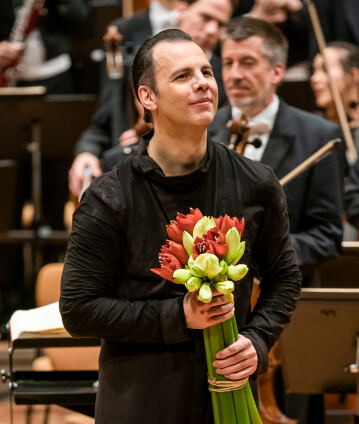Teodor Currentzis’s debut with Verdi’s Requiem

The reviews were rapturous: when Teodor Currentzis conducted Verdi’s Requiem at the Elbphilharmonie in April, it had the high suspense of a psychological thriller. For his debut with the Berliner Philharmoniker, Currentzis conducts the same work, in which Verdi describes the existential terrors of a human being in the face of death. And by bringing all his experience as an opera composer into play, he creates a unique fusion of liturgy and human emotion.
“He stages the piece as a psychological thriller,” said a review by NDR following a performance by Teodor Currentzis of Giuseppe Verdi’s Messa da Requiem. In the spring of 2019, the Greek conductor and his ensemble musicAeterna toured Europe, delighting audiences with their intense, captivating and moving interpretation of Verdi’s funeral mass. Currentzis, who has already been invited twice by the Berliner Philharmoniker Foundation to present musicAeterna in the Chamber Music Hall and the Philharmonie, now makes his debut with the Berliner Philharmoniker. Verdi’s requiem is often referred to as the Italian composer’s “best opera”. Currentzis has a very different attitude: “It’s important to me: the Verdi Requiem is sacred, even holy, music. This has to do with God. When Verdi presents himself as an agnostic, he is misleading us,” says the conductor in an interview he gave during his Requiem tour.
The death in 1873 of the great Italian writer Alessandro Manzoni, who Verdi greatly admired and venerated, was the reason behind the piece’s creation. The last movement, “Libera me”, had already been composed by Verdi five years before: following the death of Gioacchino Rossini, he had called leading Italian composers to write a requiem-pasticcio for him together. Although all his colleagues followed his appeal and submitted their contributions, his initiative failed because of the faint-heartedness of the local authorities. Verdi later took the movement he composed and integrated it with modifications into the new work. Together with the apocalyptic “Dies irae”, the liturgical sequence of the dead, in which the composer evokes the turmoil of the Last Judgement with timpani and trumpets, the “Libera me” forms the musical cornerstones of the requiem. In it, Verdi describes the existential trauma of a person in the face of death. He deploys his entire experience as an opera composer and creates a musical and dramaturgically ingenious composition that guides the listener through many emotions: fear, terror, desperation, sadness, humility, hope for salvation ... Verdi focuses on contrasts: archaism and expression, liturgy and opera, contemplation and turmoil – creating a work full of power, intensity and drama. The sudden changes in dynamics, tempo, timbre and mood make Verdi’s mass for the dead one of the most challenging and at the same time most beautiful choral works of the 19th century.
© 2019 Berlin Phil Media GmbH
Related interview
Artists
Our recommendations
- Concert, conversation and master class: Karajan conducts Beethoven’s Symphony No. 5
- Daniel Harding conducts Berlioz’s “Roméo et Juliette”
- “Late Night” concert with Pierre-Laurent Aimard
- Christian Thielemann conducts Brahms’s “Deutsches Requiem”
- Fourth concert in the Brahms/Schumann cycle with Simon Rattle
- Claudio Abbado conducts Schubert, Brahms and Schoenberg